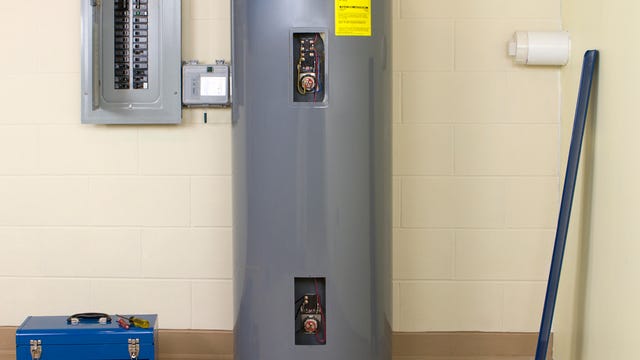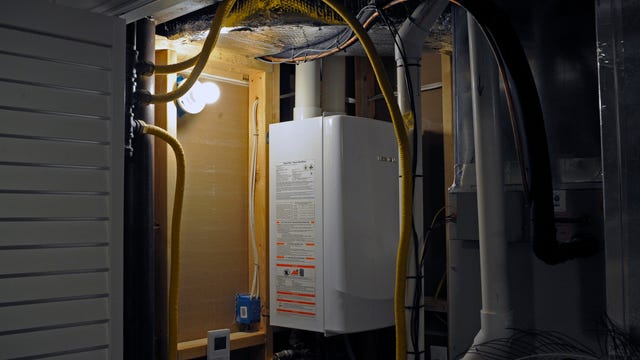The water heater in your home provides warm water for your baths, showers, kitchen and bathroom sinks, dishwasher, and more. It is an essential item to have in the home. For those looking to replace their water heater there comes the question, storage tank water heater or tankless water heater?
While the storage water heater is more affordable initially, the cost savings can add up. According to the US Department of Energy, homes with tankless water heaters using less than 41 gallons of hot water per day can see energy savings of up to 34%. Higher usage homes averaging around 86 gallons daily can still see up to 14% in energy efficiency compared to storage tank water heaters.
However, that’s not to say tankless water heaters are the best solution for everyone. Storage tank water heaters have a lower initial cost, and purchasing one that’s insulated can reduce standby heat loss and operating costs. Depending on the household’s usage of hot water, storage tank models could be a more cost-effective option.
Read on below as we compare storage tank water heaters to tankless water heaters, including initial cost, things to consider and how to size a water heater for your home’s needs.

Storage tank water heater
The storage tank water heater is the one most renters and homeowners are familiar with. A conventional storage water heater ranges from 20 to 80 gallons in capacity.
The tank is filled to capacity and heated in the reservoir using whichever fuel source your home has — electricity, gas, oil or propane. When the hot water tap is turned on, hot water is released from the top of the tank. Cold water is then filled from the bottom of the tank until it’s full, so there is always hot water available.
This process of constantly heating water in the tank contributes to standby heat loss. Standby heat loss is the amount of heat lost when the water heater isn’t being used. The older the hot water heater gets, the more standby losses can drive up energy costs.
See more: How to adjust the temperature of your water heater.

A tankless water heater, also called an instantaneous or on-demand water heater, only heats water when it is needed. Water is heated at an average rate of 2 to 5 gallons per minute using one of three fuel sources — electricity, natural gas or propane.
Tankless water heaters are more efficient than storage tank water heaters in part because there is no standby heat loss. However, one downside to a tankless water heater is the lack of capacity when running more than one hot water tap at the same time.
Gas-fired tankless heaters can also waste energy by keeping the pilot light burning to heat water in the tank to provide higher flow rates than electric water heaters. One way to combat this is to choose a model with an intermittent ignition device rather than a standing pilot light.
See more: How to buy a tankless water heater.
Other considerations
Purchase price
The capacity required for your hot water needs will determine which price range your water heater will be. When considering purchase price alone, a storage tank water heater will most often be more affordable than a tankless water heater.
The capacity, fuel source, warranty, brand and dimensions of the storage tank water heater will make a difference in the price. Expect to pay between $300 and $1,500 for a water heater, but some models and brands can run upward of $2,000.
Tankless water heaters can be purchased to heat a single sink, tub or shower (known as point-of-use tankless water heaters) — or to heat water for the whole house. The purchase price for a tankless water heater can be as low as $115 or as high as $2,500 or more. Solar-powered tankless water heaters are the most expensive, costing as much as $6,000.
There are online calculators you can use to determine sizing for both types of water heaters, including storage tank heaters if needed. You can also calculate your expected energy cost for an electric or gas water heater.
Installation cost
Just like the purchase price, installation costs vary widely, including where you’re located. Installing a point-of-use tankless water heater will be the cheapest, followed by storage tank water heaters and then whole-house tankless heaters.
Average rates to install a storage tank water heater range from $881 to $1,800. The national average to install a tankless water heater is about $1,250, with estimates as low as $350 and as high as $12,000 or more.
Some homeowners can take a DIY route with storage tank water heaters and save on the installation costs. For tankless water heaters, it’s best to leave it to a professional, as the setup is more complicated.
Performance
If you choose the right capacity for your storage tank water heater, you should not run out of hot water. This is one reason the storage tank outshines the tankless water heater. If you often run the dishwasher and washing machine at the same time, a tankless water heater might struggle to keep up with demand.
However, this can be resolved by installing more than one tankless water heater to keep up with your household demands or installing a point-of-use model where the water is being used. Use the calculators linked above to determine your needs, which can help determine the right size water heater for your home.
Energy efficiency
Tankless water heaters are an attractive alternative to storage tank water heaters for their energy efficiency. Standby heat loss is a big factor in higher energy costs and efficiency in storage tank water heaters, though purchasing an insulated unit can reduce heat loss.
The US Department of Energy estimates tankless water heaters are 8 to 34% more efficient to run than storage water heaters.
Life of the unit
When considering the life expectancy of each type of water heater, tankless heaters are expected to last longer. Estimates give storage tank water heaters about 10 to 15 years per unit, while tankless can last for 20 years or more.
One way to extend a storage water heater’s life is to replace the anode rods, a component that helps slow rust and corrosion. The frequency depends on the type of heater and if there is hard or soft water in the home.
Conclusion
In the battle of storage tank water heaters versus tankless water heaters, tankless wins in almost every category. However, you’ll pay more to purchase and install the tankless water heater. Ultimately, if price is a concern, it’s a good idea to use calculators to determine capacity needs and energy usage to find the break-even point for the higher initial cost of the tankless water heater compared to energy efficiency savings.
If your family has regular simultaneous hot water needs, consider the cost of installing two tankless heaters to keep up with demand versus installing a higher capacity storage tank water heater. If you choose a storage tank model, ask before purchase and installation to find out the price of replacing the anode rods and when it should happen, to extend its life expectancy.

Watch this: Easy Ways to Lower Your Utility Bills and Save Money




















+ There are no comments
Add yours